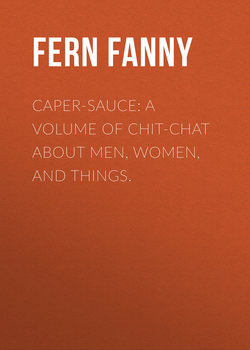Читать книгу Caper-Sauce: A Volume of Chit-Chat about Men, Women, and Things. - Fern Fanny - Страница 4
"BUDDING SPRING" – IN THE CITY
ОглавлениеWe of the city do not appreciate the blessing of closed windows and silence, until budding Spring comes. The terrific war-whoop of the milkman inaugurates the new-born day long before we should otherwise recognize it. Following him is the rag-man, with his handcart, to which six huge jangling, terrific cow-bells are fastened, as an accompaniment to the yet louder yell of "r-a-g-s." Then comes the "S-t-r-a-w-b-e-r-r-y" man, with lungs of leather, splitting your head, as you try to sip your coffee in peace. Close upon his heels, before he has hardly turned the corner, comes the pine-apple man, who tries to outscreech him. Then the fish-man, who blows a hideous tin trumpet, loud enough to rouse the Seven Sleepers, and discordant enough to set all your nerves jangling, if they had not already been taxed to the utmost. You jump up in a frenzy to close the window, only to see that the fish-man has stopped his abominable cart at the door of a neighbor, who keeps a carriage and livery, and is therefore fond of cheap, stale fish; where he is deliberately cleaning and splitting them, and throwing the refuse matter in the street, as a bouquet for your nostrils during the warm day. Then comes a procession of heavy carts, the drivers of which are lashing their skeleton nags to fury, with loud cracks of their whips, to see which shall win in the race, while every one of your window-panes shakes as if an earthquake were in progress, as they rumble over the stones. By this time comes a great mob of boys, with vigorous lungs, tossing each other's caps in the air, and screeching with a power perfectly inexplicable at only six, ten, or twelve years of practice. Indeed, the smaller the boy the bigger is his war-whoop, as a general rule. Then comes a wheezy organ-grinder, who, encouraged by the fatal show of plants in your windows, imagines you to be romantically fond of "The Morning Star," and immediately begins, in verse, to describe how he "feels." Nothing short of fifty cents will purchase his absence, which encouragement is followed by some miserable little rats of boys, anxious to succeed him on the violin and harp.
By this time your hair stands on end, and beads of perspiration form upon your nose. You fly for refuge to the back of the house. Alas! there is a young thing of "sixteen summers" and no winters running up and down the gamut on a tin-kettle piano. In the next house is a little dog barking as if his last hour was coming; while upon the shed are two cats, in the most inflamed state of bristle, glaring like fiends, and "maow" – ing in the most hellish manner at each other's whiskers. You go down into the parlor, and seat yourself there. Your neighbor, Tom Snooks, is smoking at his window, and puffing it right through yours over your lovely roses, the perfume of which he quite extinguishes with his nasty odor.
Heavens! And this is "Spring!" "Budding Spring!" The poets make no mention of these little things in their "Odes!"
Well – at least, you say to yourself, there will be peace and heavenly quiet with the stars at midnight, by the open window. I will be patient till then.
Is there?
What is that? A policeman's loud rap-rap on the pavement for assistance to capture a burglar. Next a woman's scream; the brute who just accosted the poor wretch has struck her a heavy blow upon the temple. And now reels past a drunken man, zigzagging down the street, with a little whimpering boy by one hand, old enough to know what a "Station-house" means, and trembling lest "father" should be taken there.
You throw yourself upon your bed, weary and sick at heart. Even the stars seem to glow with a red, unnatural light, as if they too were worn with watching the wrongs and frets they nightly look down upon.
"Balmy night." What liars poets can be!
